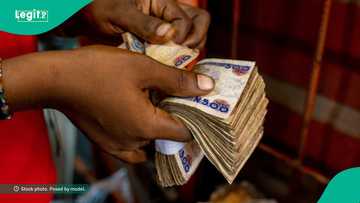CBN Injects $52 Million, Sees Record N3.5 Trillion Bank Deposits After Rate Cut
- Banks’ deposits with the Central Bank of Nigeria (CBN) have surged to a historic high of N3.5 trillion
- The development followed the cut in interest rate by the apex bank following the easing of inflation to 22.11%
- Experts said that while a record deposit level signals deep liquidity, it also raises questions about lending by the banks
Pascal Oparada, a reporter for Legit.ng, has over ten years of experience covering technology, energy, stocks, investment, and the economy.
The Central Bank of Nigeria (CBN) has recorded a historic surge in bank deposits through its Standing Deposit Facility (SDF), with deposits jumping to N3.5 trillion in one session.
This followed a recent cut in the Monetary Policy Rate (MPR), which boosted liquidity in the system.

Source: Twitter
The SDF allows authorised banks to park excess funds overnight with the CBN and earn interest without collateral.
Mechanics: How it happened
It’s one of the tools the apex bank uses to manage market tightness and stabilise currency fluctuations, according to a report by BusinessDay.
On the day before the surge, banks held N2.55 trillion, meaning the increase was sharp and sudden.
The jump suggests that banks had liquidity they were unsure how to deploy, so they parked it safely with the central bank.
The rate cut likely encouraged this behaviour: with cheaper rates, the opportunity cost of holding excess cash is lower, pushing institutions to use the SDF rather than risk lending into uncertain markets.
Implications for credit, upstream, and energy
While a record deposit level signals deep liquidity, it also raises questions. If banks prefer to park funds rather than lend, the stimulus effect of the rate cut may not fully transmit to the real economy, especially the upstream oil sector, which relies on capital-intensive investments.
In Nigeria’s upstream sector:
- Oil operators need predictable and affordable credit to fund exploration, drilling, and maintenance.
- A scenario where banks hold liquidity rather than extend loans could tighten access to funding for oil and gas projects.
- For new players or firms attempting to acquire assets or do divestments, financing becomes more difficult if banks remain risk-averse.
Risks and outlook
Analysts caution that the deposit surge might also reflect heightened uncertainty among banks—opting for security over risk. This can reduce credit flow to productive sectors unless confidence is rebuilt.
For the upstream and energy sector, slower credit means delays in well servicing, expansion, or asset acquisitions. That could translate to stagnation or decline in production levels.
Yet, there’s a silver lining: if the CBN can sustain this level of liquidity while nudging banks to lend, the rate cut might still foster growth in critical sectors. The challenge lies in converting passive liquidity into active capital deployment.

Source: Twitter
Nigeria’s banking system has shown resilience, and this record deposit is a signal of banks’ trust in the central bank. The test now is whether that trust is repaid by fostering more investment, particularly in energy, infrastructure, and other high-capital sectors.
CBN confirms 14 banks meet recapitalisation target
Legit.ng earlier reported that with six months to the March 31, 2026, deadline, the Central Bank of Nigeria (CBN) confirmed that 14 banks have scaled the recapitalisation hurdle.
The governor of the CBN, Olayemi Cardoso, disclosed this on Tuesday, September 23, 2025, during the Monetary Policy Committee (MPC) meeting in Abuja.
The CBN boss said the financial sector remained resilient, with most financial soundness indicators remaining within the projected benchmarks.
Proofreading by Funmilayo Aremu, copy editor at Legit.ng.
Source: Legit.ng




